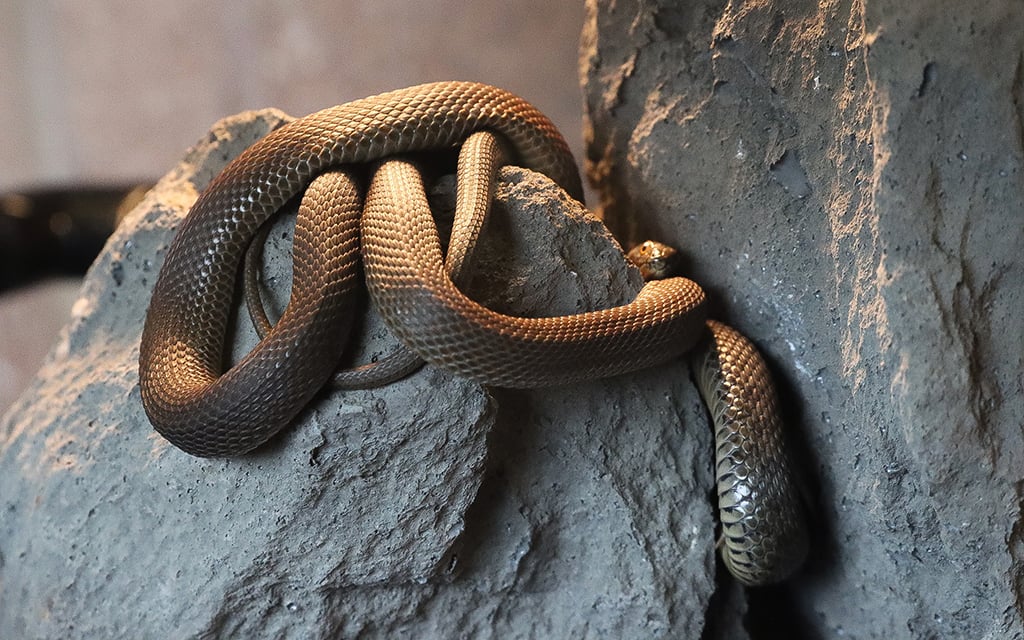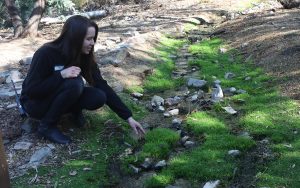
A juvenile narrow-headed garter snake at the conservation center at the Phoenix Zoo on April 15, 2024. (Photo by Mariah Temprendola/Cronkite News)

Alyssa Bullock, Phoenix Zoo conservation technician, tests the water in a springsnail habitat on April 15, 2024 ,at the Phoenix Zoo. (Photo by Mariah Temprendola/Cronkite News)

Alyssa Bullock, Phoenix Zoo conservation technician, weighs a juvenile narrow-headed garter snake at the zoo on April 15, 2024. (Photo by Mariah Temprendola/Cronkite News)

Alyssa Bullock, Phoenix Zoo conservation technician, tends to tanks that serve as springsnail habitat on April 15, 2024, at the zoo. (Photo by Mariah Temprendola/Cronkite News)
PHOENIX – Tara Harris’ fascination with science began in childhood, eventually forming into her passion for conserving native species. Harris believes animals play vital roles in the environment, yet recognizes some are overlooked.
“I really found a passion for them and wanted to work with our partners to help save them,” Harris said. “I feel like I can make a tangible difference for them right here at home.”
Harris is the director of conservation and science at the Phoenix Zoo, where she conducts research and participates in field work. It’s here that Harris works with conservation technicians like Alyssa Bullock working to save species under threat.

Tara Harris, Phoenix Zoo director of conservation and science, checks on plant growth on Jan. 25, 2024, at the zoo. She oversees conservation programs to recover native species. (Photo by Mariah Temprendola/Cronkite News)
The Phoenix Zoo website lists nine native species who are the focus of conservation projects that scientists there are working on. They include the black-footed ferret, Chiricahua leopard frog, cactus ferruginous pygmy-owl, desert pupfish, narrow-headed gartersnake, Huachuca water umbel, three types of springsnail, Mount Graham red squirrel and Gila topminnow. Helping these animals requires scientists to stay on top of a number of daily tasks, including testing water, weighing animals and checking habitats.
Scientists at the Phoenix Zoo are working to breed animals, such as the narrow-headed garter snake, at the zoo’s Arthur L. and Elaine V. Johnson Conservation Center to better understand their biology and reproduction. The narrow-headed garter snakes are listed as threatened under the U.S. Endangered Species Act, mainly due to the loss of native fish in Arizona and across the Southwest, as fish are their primary diet.
Harris said knowledge of endangered species is lacking in many people outside the conservation center. “This is what I love,” Harris said. “It’s the challenge of figuring it out, and that’s what really drives us to be successful in it.”

A juvenile narrow-headed garter snake at the conservation center at the Phoenix Zoo on April 15, 2024. (Photo by Mariah Temprendola/Cronkite News)
The ultimate goal is that these snakes will be released into the wild. The zoo has been successful with the last two years yielding six litters of narrow-headed garter snakes that have been released, the largest number for this species anywhere, according to Harris. It’s this type of work that drives her.
“I’m settled here at the Phoenix Zoo long term,” Harris said. “I really just love the team that we have here, the diversity of species, and partners that we work with are critical for our success.”
